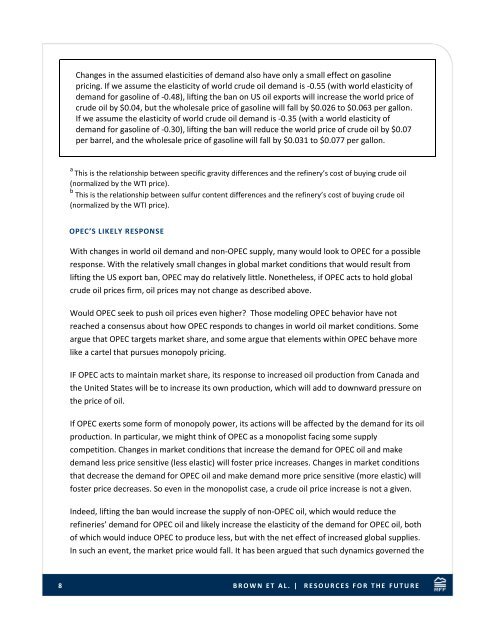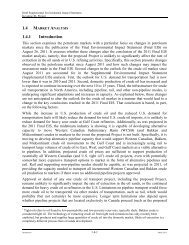tuw5P
tuw5P
tuw5P
Create successful ePaper yourself
Turn your PDF publications into a flip-book with our unique Google optimized e-Paper software.
Changes in the assumed elasticities of demand also have only a small effect on gasolinepricing. If we assume the elasticity of world crude oil demand is -0.55 (with world elasticity ofdemand for gasoline of -0.48), lifting the ban on US oil exports will increase the world price ofcrude oil by $0.04, but the wholesale price of gasoline will fall by $0.026 to $0.063 per gallon.If we assume the elasticity of world crude oil demand is -0.35 (with a world elasticity ofdemand for gasoline of -0.30), lifting the ban will reduce the world price of crude oil by $0.07per barrel, and the wholesale price of gasoline will fall by $0.031 to $0.077 per gallon.a This is the relationship between specific gravity differences and the refinery’s cost of buying crude oil(normalized by the WTI price).b This is the relationship between sulfur content differences and the refinery’s cost of buying crude oil(normalized by the WTI price).OPEC’S LIKELY RESPONSEWith changes in world oil demand and non-OPEC supply, many would look to OPEC for a possibleresponse. With the relatively small changes in global market conditions that would result fromlifting the US export ban, OPEC may do relatively little. Nonetheless, if OPEC acts to hold globalcrude oil prices firm, oil prices may not change as described above.Would OPEC seek to push oil prices even higher? Those modeling OPEC behavior have notreached a consensus about how OPEC responds to changes in world oil market conditions. Someargue that OPEC targets market share, and some argue that elements within OPEC behave morelike a cartel that pursues monopoly pricing.IF OPEC acts to maintain market share, its response to increased oil production from Canada andthe United States will be to increase its own production, which will add to downward pressure onthe price of oil.If OPEC exerts some form of monopoly power, its actions will be affected by the demand for its oilproduction. In particular, we might think of OPEC as a monopolist facing some supplycompetition. Changes in market conditions that increase the demand for OPEC oil and makedemand less price sensitive (less elastic) will foster price increases. Changes in market conditionsthat decrease the demand for OPEC oil and make demand more price sensitive (more elastic) willfoster price decreases. So even in the monopolist case, a crude oil price increase is not a given.Indeed, lifting the ban would increase the supply of non-OPEC oil, which would reduce therefineries’ demand for OPEC oil and likely increase the elasticity of the demand for OPEC oil, bothof which would induce OPEC to produce less, but with the net effect of increased global supplies.In such an event, the market price would fall. It has been argued that such dynamics governed the8 B R O W N E T A L . | R E S O U R C E S F O R T H E F U T U R E



